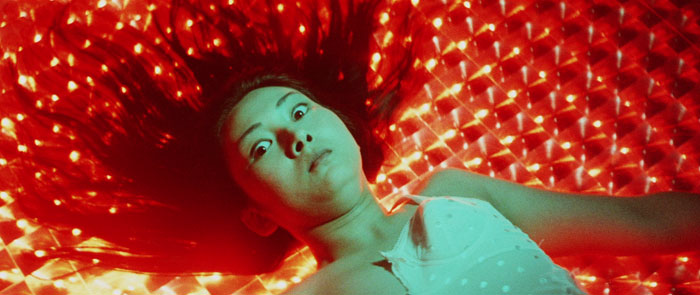
Female Prisoner #701: Scorpion (1972)
***½/**** Image A- Sound B+ Extras B+
starring Meiko Kaji, Natsuyagi Isao, Rie Yokoyama, Fumio Watanabe
written by Fumio Kônami and Hirô Matsuda, from the manga by Toru Shinohara
directed by Shunya Itô
Female Prisoner Scorpion: Jailhouse 41 (1972)
****/**** Image A- Sound B+ Extras B+
starring Meiko Kaji, Kayoko Shiraishi, Fumio Watanabe, Eiko Yanami
written by Shunya Itô, Fumio Kônami and Hirô Matsuda, from the manga by Toru Shinohara
directed by Shunya Itô
Female Prisoner Scorpion: Beast Stable (1973)
***/**** Image B+ Sound B+ Extras B
starring Meiko Kaji, Mikio Narita, Koji Nanbara, Yayoi Watanabe
written by Hirô Matsuda, from the manga by Toru Shinohara
directed by Shunya Itô
Female Prisoner Scorpion: #701’s Grudge Song (1973)
**½/**** Image B+ Sound B+ Extras B
starring Meiko Kaji, Masakazu Tamura, Toshiyuki Hosokawa, Sanae Nakahara
written by Fumio Kônami, Hirô Matsuda and Yasuharu Hasebe, from the manga by Toru Shinohara
directed by Yasuharu Hasebe
by Bryant Frazer One of the most audacious debuts in cinematic history is rookie Shunya Itô’s expressionist rape-revenge saga, the Female Prisoner Scorpion trilogy. These three films, released in the 11-month period between August 1972 and July 1973, elevate Japanese studio Toei’s series of “pinky violence” sexploitation films with daring, theatrical visuals reminiscent of the bold work that got Seijun Suzuki fired from Nikkatsu and a subversive sensibility that could be described as genuinely feminist. Of course, Itô’s studio bosses didn’t have art in mind. Loosely adapted from a popular manga, the first Scorpion was conceived as a gender-swapped take on Teruo Ishii’s popular Abashiri Prison film series, on which Itô had worked as assistant director. Moving the story from a men’s prison to a women’s prison accommodated sensationalized images of nudity and sexual violence, which even major Japanese studios were relying on in the early 1970s as a way to compete with American imports. But Itô talked his screenwriters into throwing out their derivative original script and starting anew. He also convinced Meiko Kaji, a rising star thanks to her appearances in the popular Stray Cat Rock movies about Japanese youth street culture, to take on the title role. (Kaji arrived at Toei from Nikkatsu after the latter studio diverted its production resources to so-called “Roman porno” softcore in an attempt to compete with the popularity of television.) The results are singular. Itô’s flamboyant visuals created florid showcases for Kaji’s riveting screen presence, especially her oft-deployed 1,000-yard stare–a stone-cold, daggers-to-your-eyeballs glare of the type seen elsewhere in only the most unnerving of horror films. Itô and Kaji turned out to be an electrifying combination.

